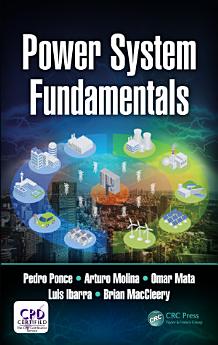Power System Fundamentals
Dis 2017 · CRC Press
I-Ebook
445
Amakhasi
family_home
Kufanelekile
info
reportIzilinganiso nezibuyekezo aziqinisekisiwe Funda Kabanzi
Mayelana nale ebook
Smart grids are linked with smart homes and smart meters. These smart grids are the new topology for generating, distributing, and consuming energy. If these smart devices are not connected in a smart grid, then they cannot work properly; hence, the conventional power systems are swiftly changing in order to improve the quality of electrical energy. This book covers the fundamentals of power systems—which are the pillars for smart grids —with a focus on defining the smart grid with theoretical and experimental electrical concepts. Power System Fundamentals begins by discussing electric circuits, the basic systems in smart grids, and finishes with a complete smart grid concept. The book allows the reader to build a foundation of understanding with basic and advanced exercises that run on simulation before moving to experimental results. It is intended for readers who want to comprehensively cover both the basic and advanced concepts of smart grids.
Mayelana nomlobi
Pedro Ponce studied engineering in automation and control and graduated in 1995. Subsequently, he completed his graduate studies, obtaining the degree of Master of Science in 1998 and Doctor of Science in 2002. He worked as a field and design engineer in several industries. He specializes in the areas of industrial automation systems, electrical machines, electric drives, power electronics, conventional and digital control, expert systems, neural networks fuzzy logic, biological artificial systems, and evolutionary systems. He is a professor and a researcher at Tecnologico de Monterrey campus Ciudad de Mexico.
Arturo Molina
is a professor and researcher, as well as Vice President of Research, Postgraduate Studies and Continuing Education, at the Tecnologico de Monterrey. He has a bachelor’s degree in computational systems and a master’s degree in computational sciences (1990) from the Tecnologico de Monterrey, Campus Monterrey (1986), a doctorate degree in mechanics from the Technical University of Budapest (1992), and another in manufacturing systems from the Loughborough University of Technology in England (1995).Omar Mata
holds a BS degree in telecommunications and electronic systems (2010) from Tecnologico de Monterrey and the degree of Master of Science (2013) from the same institution. Since 2015, he has been the CEO and co-founder of Uberproto Technologies, which is a company specializing in the development of software and electronic technologies. He has been a research assistant and professor at the Tecnologico de Monterrey campus Ciudad de Mexico since 2011. He specializes in the areas of robotics and digital systems with interest in fuzzy logic control.Luis M. Ibarra
received the BS degree in mechatronics engineering from Tecnologico de Monterrey, Mexico City, Mexico, in 2011 and the PhD degree in intelligent control from the same institution in 2016. He is currently working as a researcher for a project headed by the Mexican Energy Secretariat (SENER) and the Mexican Science and Technology Council (CONACYT) with special focus on power electronics control. From 2012 to 2015, he was a research assistant and lecturer with the Tecnologico de Monterrey, Mexico City, Mexico. His research interests include robust and intelligent control techniques, power electronics, and renewable energies. Most of his work is centered in fuzzy logic control, robust control, and electric machinery.Brian MacCleery
helps small to medium businesses bring innovative clean energy products to market. He guides National Instruments strategic R&D and product development for embedded control and measurement with a focus on customer oriented design tools for advanced control. In his 15-year tenure at NI, MacCleery led market research, product definition, launch and growth of the successful NI CompactRIO platform and product strategy for the popular LabVIEW FPGA toolchain. MacCleery holds bachelor and master degrees in electrical and computer engineering from Virginia Tech where he now serves on the Industry Advisory Board. He completed his graduate research in power electronics and linear switched reluctance motor drives under the direction of Dr. Krishnan Ramu and led multidisciplinary teams in the development of novel magnetic levitation and propulsion vehicle systems.Nikeza le ebook isilinganiso
Sitshele ukuthi ucabangani.
Ulwazi lokufunda
Amasmathifoni namathebulethi
Faka uhlelo lokusebenza lwe-Google Play Amabhuku lwe-Android ne-iPad/iPhone. Livunyelaniswa ngokuzenzakalela ne-akhawunti yakho liphinde likuvumele ukuthi ufunde uxhunywe ku-inthanethi noma ungaxhunyiwe noma ngabe ukuphi.
Amakhompyutha aphathekayo namakhompyutha
Ungalalela ama-audiobook athengwe ku-Google Play usebenzisa isiphequluli sewebhu sekhompuyutha yakho.
Ama-eReaders namanye amadivayisi
Ukuze ufunde kumadivayisi e-e-ink afana ne-Kobo eReaders, uzodinga ukudawuniloda ifayela futhi ulidlulisele kudivayisi yakho. Landela imiyalelo Yesikhungo Sosizo eningiliziwe ukuze udlulise amafayela kuma-eReader asekelwayo.




